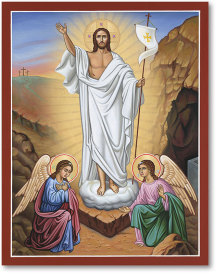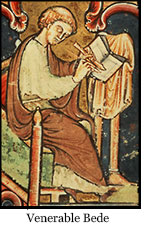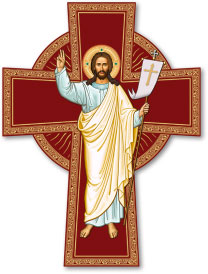 Where does the term "Easter" come from? The earliest reference to this term for the day of the Lord's Resurrection appears in the writings of 7th century English monk and historian Saint Bede (Bede the Venerable), who wrote:
Where does the term "Easter" come from? The earliest reference to this term for the day of the Lord's Resurrection appears in the writings of 7th century English monk and historian Saint Bede (Bede the Venerable), who wrote:
"Eosturmonath has a name which is now translated 'Paschal month,' and which was once called after a goddess of [the pagan Anglo-Saxons] named Eostre, in whose honour feasts were celebrated in that month. Now they designate that Paschal season by her name, calling the joys of the new rite by the time-honoured name of the old observance."
 The Greek and Latin words translated as "pascha" are derived from Hebrew Pesach meaning the festival of Passover, and so the Greek Orthodox Church refers to the feast of the Resurrection as Pascha. They also use the word Anástasis (upstanding, up-rising, resurrection) as an alternative. And In most Slavic languages, the name for Easter either means "Great Day" or "Great Night."
The Greek and Latin words translated as "pascha" are derived from Hebrew Pesach meaning the festival of Passover, and so the Greek Orthodox Church refers to the feast of the Resurrection as Pascha. They also use the word Anástasis (upstanding, up-rising, resurrection) as an alternative. And In most Slavic languages, the name for Easter either means "Great Day" or "Great Night."
Why is Easter on a different date each year?
Easter is a moveable feast, meaning it is not fixed in relation to the civil calendar.The First Council of Nicaea (325 A.D.) established the date of Easter as the first Sunday after the full moon (the Paschal Full Moon) following the northern hemisphere's vernal equinox. The date of  Easter therefore varies between March 22 and April 25.
Easter therefore varies between March 22 and April 25.
Why do the Western and Eastern churches sometimes celebrate Easter on different dates?
The Eastern churches base their calculations of the date for Easter on the Julian Calendar whose March 21 corresponds, during the 21st century, to April 3 in the Gregorian Calendar. So their celebration of Easter therefore varies between April 4 and May 8.